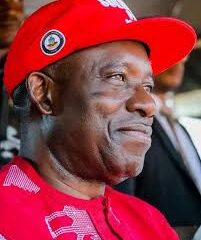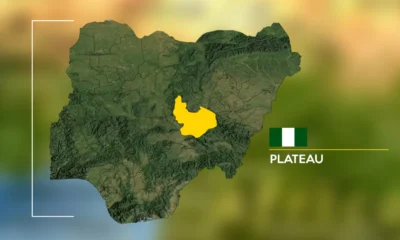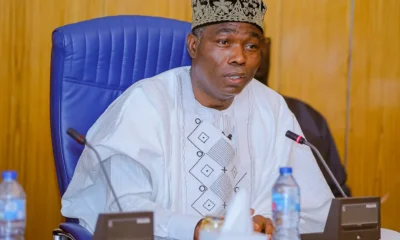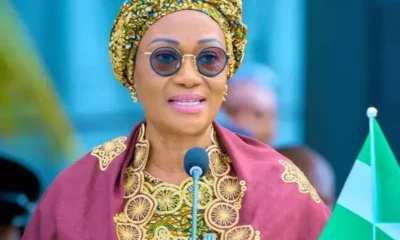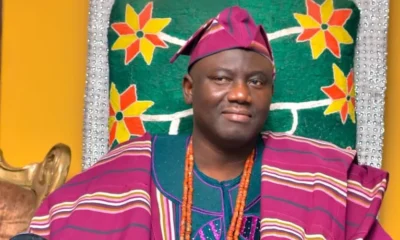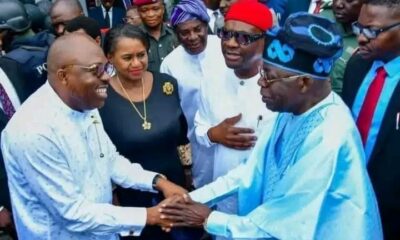Politics
Tinubu family courts students and market traders as 2027 race looms

President Bola Tinubu is already looking to 2027. His inner circle is, too — focusing on two decisive voting blocs: young Nigerians and women.
The president’s son, Seyi Tinubu, 40, has cultivated ties with student leaders, while his daughter, Folasade Tinubu-Ojo, 49, is expanding her influence among market traders nationwide.
Nigeria’s first lady,Oluremi Tinubu, a veteran politician, has also channelled large sums into women-focused programmes over the past year.
Why youths and women matter
Young voters and women are Nigeria’s largest constituencies.
Two years ago, 18–34-year-olds accounted for roughly 37 million (about 40%) of the 93.4 million registered voters, while women comprised 44.4 million (47.5%).
The electoral commission has begun registering new voters for the 2027 election. Of the 6.8 million people who pre-registered online eight weeks into the exercise, 4.6 million are aged 18–34. Political scientists say that makes students a pivotal swing group.
The Labour party’s Peter Obi mobilised youth support to win 6.1 million votes in 2023, finishing third. Tinubu’s 8.7 million-vote victory — upheld in court — was dogged by controversy over the election commission’s bungled real-time results display.
The student push
Much of the ruling party’s youth strategy now runs through Seyi’s outreach to the National Association of Nigerian Students (NANS). His growing sway has prompted accusations of political capture.
In May, Henry Okunomo, a former NANS Senate president, accused Seyi of “hijacking” the 45-year-old association. In the run-up to the association’s national elections earlier this year, NANS fractured into rival camps and the faction widely seen as close to Seyi prevailed.
What opponents dismiss as transactional politics, allies defend as social investment
A rival figure, Atiku Isah, said he was abducted and assaulted after rejecting a purported N100m ($67,997) inducement to back the president. Seyi, Youth Minister Ayodele Olawande, and the student’s association have all denied the allegations. Isah later recanted his statement, claiming it was misinformation from an opponent.
NANS leaders have since defended Seyi in public spats. When Shamsudeen Mohammed — son of the Bauchi State governor,Bala Mohammed— criticised a Ramadan outreach that distributed food and cash in the north, Okunomo praised Seyi’s “generosity and benevolence”. What opponents dismiss as transactional politics, allies defend as social investment.
The market network
Following her father’s inauguration, Tinubu-Ojo styled herself as the Iyaloja-General of Nigeria. The title — derived from the Yoruba word Iyaloja, meaning ‘Mother of the Market’ — marked her move from a Lagos-based role to a national platform. She has since tried to build a national network of market women, a historically potent force in south-west mobilisation.
That effort met resistance in Benin City, Edo state. Tinubu-Ojo sought recognition for Josephine Ibhaguezejele as Iyaloja of Edo. The Oba of Benin rejected the move during her palace visit, saying the Iyaloja concept is ‘alien’ to Benin’s traditions.
The Benin Traditional Council said each market has its own leader, known as an Iyeki, with cultural and spiritual functions, and warned against politicisation. Local market representatives publicly backed the monarch.
Critics have also questioned the choice of Ibhaguezejele — described by supporters as a pastor — as an outsider to Benin City. “She is seen as an Esan, not Benin,” said Dave Aibangbe, an Edo-born analyst.
The long game
Tinubu’s camp knows it must blunt Obi’s youth appeal while shoring up women’s votes. Embedding trusted family figures within student and market structures offers proximity and patronage — and, if it works, turnout. The strategy, however, risks backlash where it clashes with local norms or looks heavy-handed.
Whether these parallel drives translate into votes will depend on delivery: jobs and inflation for students and first-time voters; credit, security and market infrastructure for traders. In Nigeria’s retail politics, handouts can open doors — but poor performance can close them again. (The Africa Report)
-

 News18 hours ago
News18 hours agoSouth-East Breathes as Monday Sit-at-Home Officially Ends; Markets and Schools Reopen
-

 News18 hours ago
News18 hours agoGunmen Kill One, Abduct Imam, 7 Others In Plateau Community
-

 Politics18 hours ago
Politics18 hours ago‘Stop Funding Your Oppressors’ — Angry Youths Launch Boycott of Odogwu Bitters and Celebrity Channels Over Political Ties
-

 Politics18 hours ago
Politics18 hours ago‘Put E-Transmission in Law or Resign’ — SDP’s Adewole Adebayo Issues Ultimatum to Tinubu and NASS
-

 News17 hours ago
News17 hours agoI Never Thought Trump Would Recognise Me – Remi Tinubu
-

 News3 hours ago
News3 hours agoOyo princes launch court fight to preserve Alaafin’s supremacy
-

 Politics3 hours ago
Politics3 hours agoRivers Peace Accord: Tinubu Orders Wike to Halt Impeachment, Hands APC Structure to Fubara
-

 Opinion18 hours ago
Opinion18 hours agoMarriage and money: When comparison turns love into pressure



